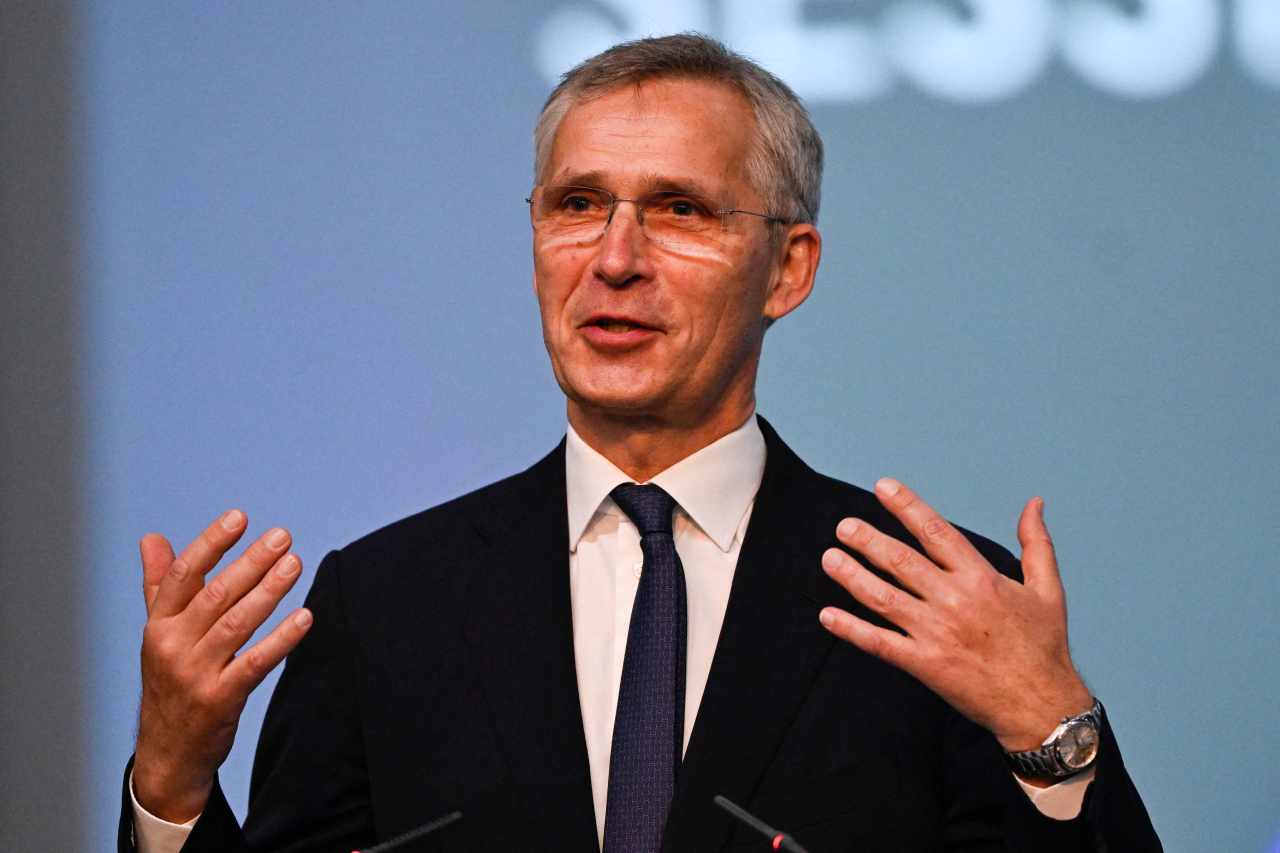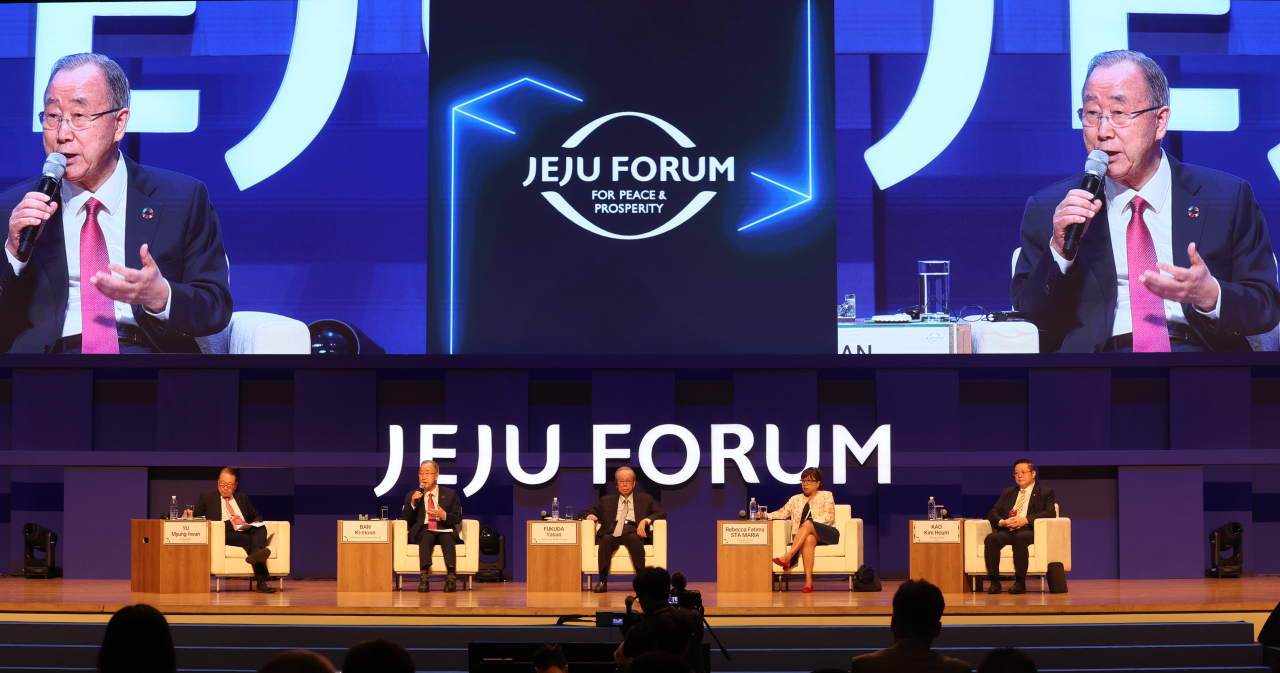NATO-S. Korea ties, ‘powerful signal’ against rule breakers: Stoltenberg
By Ji Da-gyumPublished : May 30, 2024 - 15:25

JEJU ISLAND -- NATO Secretary General Jens Stoltenberg said Thursday that the increasing cooperation between the North Atlantic alliance and its Indo-Pacific partners including South Korea, sends a "powerful signal" against active attempts by countries including Russia to "rip up" the rules-based international order.
"These ties matter today more than ever. We live in a dangerous world," Stoltenberg stated in a keynote speech via video at the opening ceremony of the 19th Jeju Forum, held under the theme "Acting Together for a Better World."
The NATO Secretary General emphasized that the NATO delegation's first participation at the Jeju Forum underscored "the important and ever-growing ties between the North Atlantic alliance and the Indo-Pacific region."
"Our growing ties send a powerful signal at a critical time," Stoltenberg said. "When countries like Russia try to rip up the global rules and laws, we stand united and strong to protect our way of life and prosperity, prevent war and preserve peace."
Stoltenberg underscored that security – from the Euro-Atlantic to the Indo-Pacific – is "at stake," citing challenges, including Russia’s war against Ukraine, the wars in the Middle East as well as threats from terrorism to cyber-attacks, nuclear proliferation and persisting climate change.
"We see active attempts by states to tear up the rules-based international order which has benefitted us all, for decades," he said. "This affects us all."
Against that backdrop, Stoltenberg highlighted that NATO is also deepening its cooperation with its Indo-Pacific partners in several practical areas, such as enhancing cybersecurity, countering disinformation campaigns, and ensuring emerging technologies benefit NATO and its partners rather than work against them.
NATO's four Asia-Pacific partners, known as the AP4, include South Korea, Australia, Japan, and New Zealand.
"At the same time, we are strengthening our political dialogue on security issues of common concern," Stoltenberg said.
NATO Secretary General said he invited the AP4 leaders, including South Korean President Yoon Suk Yeol, to the upcoming NATO Summit in Washington this July.
In his speech, South Korean Prime Minister Han Duck-soo emphasized, "South Korea will play a leading role in safeguarding global peace and security, actively engaging in overcoming global crises," leveraging the opportunity of South Korea's rotating presidency of the UN Security Council.
Han also expressed South Korea's commitment to "advance alongside the Global South as reciprocal partners, supporting their growth based on our own experience of economic development."
Han said the first-ever Korea-Africa summit on June 4 and 5, the Korea-Latin America Future Cooperation Forum on June 10, and the Korea-ASEAN summit in October will serve as good opportunities to that end.

Participants also voiced concerns over the growingly polarized world despite multifaceted crises including grinding wars in the Middle East and Ukraine during the special session "Acting Together for a Better World" held just before the opening ceremony.
Former UN Secretary-General Ban Ki-moon said, "In a nutshell, we are living, we are standing on the edge of the precipice," emphasizing that the foundations of international law and even the UN are now in very difficult situations.
"Now, unfortunately, the global leaders are completely divided, much more so. Now, we are at risk of all these international organizations, international law, and international agreements are on the verge of collapsing because of the political divisions," he said, "Never in the past have we been experiencing this kind of situation."
ASEAN Secretary-General Kao Kim Hourn said, "What we see is that there is increasing strategic competition but identity is all about strategic mistrust."
Kao further noted that the world is confronted with a multitude of crises, spanning climate and environmental concerns, health emergencies and humanitarian disasters stemming from Russia's conflict in Ukraine and the Israel-Hamas war.
"The world has become more polarized. When we polarize, we paralyze," Kao said, highlighting the deadlock within the UN Security Council despite ongoing crises.



















![[Today’s K-pop] Treasure to publish magazine for debut anniversary](http://res.heraldm.com/phpwas/restmb_idxmake.php?idx=642&simg=/content/image/2024/07/26/20240726050551_0.jpg&u=)